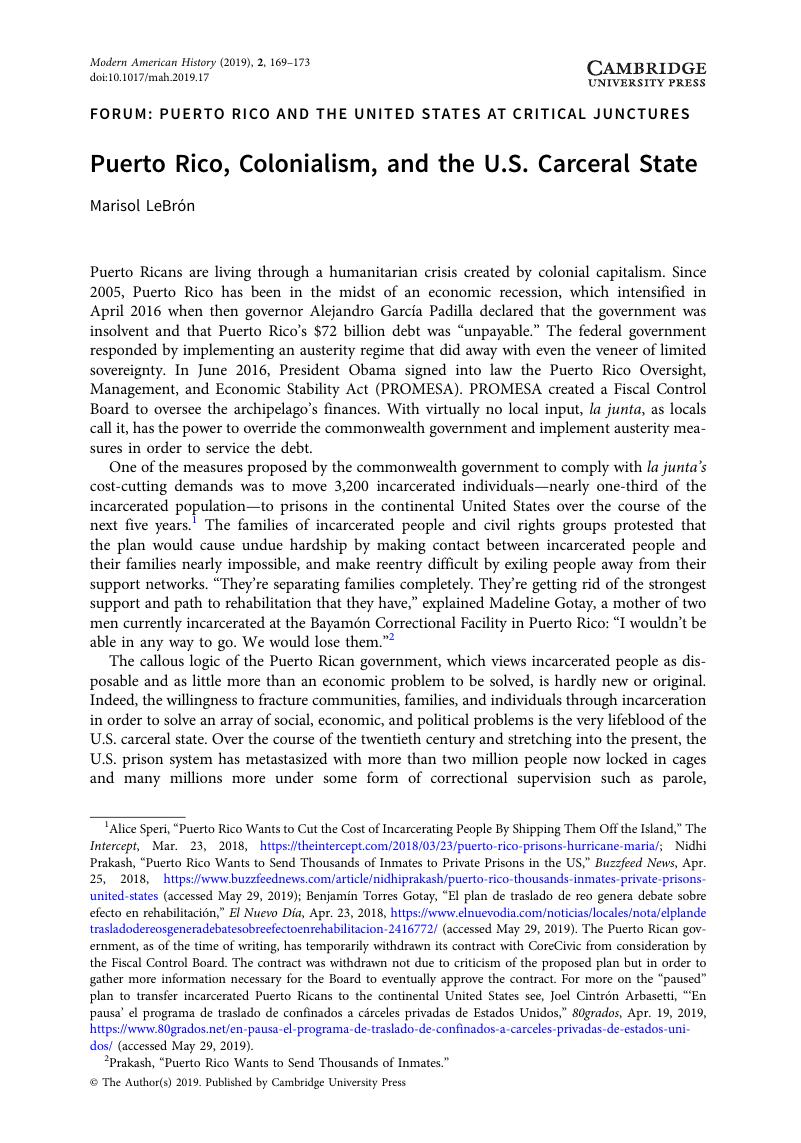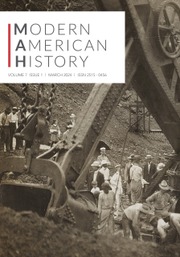Article contents
Puerto Rico, Colonialism, and the U.S. Carceral State
Published online by Cambridge University Press: 02 August 2019
Abstract

- Type
- Forum: Puerto Rico and the United States at Critical Junctures
- Information
- Copyright
- Copyright © The Author(s) 2019. Published by Cambridge University Press
References
1 Alice Speri, “Puerto Rico Wants to Cut the Cost of Incarcerating People By Shipping Them Off the Island,” The Intercept, Mar. 23, 2018, https://theintercept.com/2018/03/23/puerto-rico-prisons-hurricane-maria/; Nidhi Prakash, “Puerto Rico Wants to Send Thousands of Inmates to Private Prisons in the US,” Buzzfeed News, Apr. 25, 2018, https://www.buzzfeednews.com/article/nidhiprakash/puerto-rico-thousands-inmates-private-prisons-united-states (accessed May 29, 2019); Benjamín Torres Gotay, “El plan de traslado de reo genera debate sobre efecto en rehabilitación,” El Nuevo Día, Apr. 23, 2018, https://www.elnuevodia.com/noticias/locales/nota/elplandetrasladodereosgeneradebatesobreefectoenrehabilitacion-2416772/ (accessed May 29, 2019). The Puerto Rican government, as of the time of writing, has temporarily withdrawn its contract with CoreCivic from consideration by the Fiscal Control Board. The contract was withdrawn not due to criticism of the proposed plan but in order to gather more information necessary for the Board to eventually approve the contract. For more on the “paused” plan to transfer incarcerated Puerto Ricans to the continental United States see, Joel Cintrón Arbasetti, “‘En pausa’ el programa de traslado de confinados a cárceles privadas de Estados Unidos,” 80grados, Apr. 19, 2019, https://www.80grados.net/en-pausa-el-programa-de-traslado-de-confinados-a-carceles-privadas-de-estados-unidos/ (accessed May 29, 2019).
2 Prakash, “Puerto Rico Wants to Send Thousands of Inmates.”
3 For example, see the special issue “Historians and the Carceral State,” Journal of American History 102, no. 1 (June 2015) and a special section on “Urban America and the Carceral State,” Journal of Urban History 41, no. 5 (Sept. 2015).
4 Indigenous scholars have labored to demonstrate the ways in which our contemporary carceral system is born out of the history of slavery and settler colonialism in the United States. Luana Ross, Inventing the Savage: The Social Construction of Native American Criminality (Austin, TX, 1998) remains an invaluable text for understanding this history. See also, Nick Estes's interview with Rustbelt Radio: “Native Resistance and the Carceral State,” July 11, 2018, https://rustbeltradio.org/2018/07/11/ep19/ (accessed May 29, 2019). Additionally, scholars such as Jenna Loyd, Naomi Paik, Stuart Schrader, and Micol Seigel detail the transnational nature of the U.S. carceral state and its roots in imperial action and colonization.
5 For example, see Parenti, Christian, Lockdown America: Police and Prisons in the Age of Crisis (London, 1999)Google Scholar; Flamm, Michael W., Law and Order: Street Crime, Civil Unrest, and the Crisis of Liberalism in the 1960s (New York, 2005)Google Scholar; Weaver, Vesla M., “Frontlash: Race and the Development of Punitive Crime Policy,” Studies in American Political Development 21, no. 2 (Fall 2007): 230–65CrossRefGoogle Scholar; Thompson, Heather Ann, “Why Mass Incarceration Matters: Rethinking Crisis, Decline, and Transformation in Postwar American History,” Journal of American History 97, no. 3 (Dec. 2010): 703–34CrossRefGoogle Scholar; Berger, Dan, “Social Movements and Mass Incarceration,” Souls: A Critical Journal of Black Politics, Culture, and Society 15, no. 1 (2013): 3–18CrossRefGoogle Scholar; and Hinton, Elizabeth, From the War on Poverty to the War on Crime: The Making of Mass Incarceration in America (Cambridge, MA, 2016)CrossRefGoogle Scholar.
6 Hernández, Kelly Lytle, City of Inmates: Conquest, Rebellion, and the Rise of Human Caging in Los Angeles, 1771–1965 (Chapel Hill, NC, 2017), 2CrossRefGoogle Scholar.
7 Santiago-Valles, Kelvin A., “Subject People” and Colonial Discourses: Economic Transformation and Social Disorder in Puerto Rico, 1898–1947 (Albany, NY, 1994), 71–3Google Scholar.
8 For information on the exile of surplus labor see, for instance, Dietz, James, Economic History of Puerto Rico: Institutional Change and Capitalist Development (Princeton, NJ, 1986), 227–8Google Scholar. For information on the criminalization of pro-independence dissidents, see Bosque-Pérez, Ramón and Morera, José Javier Colón, eds., Puerto Rico under Colonial Rule: Political Persecution and the Quest for Human Rights (Albany, NY, 2006)Google Scholar; and Ivonne Acosta-Lespier, “The Smith Act Goes to San Juan: La Mordaza, 1948–1957,” in Puerto Rico under Colonial Rule, ed. Bosque-Pérez and Morera, 62.
9 See, for example, Berger, Dan, The Struggle Within: Prisons, Political Prisoners, and Mass Movements in the United States (Oakland, CA, 2014)Google Scholar.
10 Dan Berger, “Scales of Struggle and the Carceral State,” Black Perspectives, Oct. 29, 2018, https://www.aaihs.org/scales-of-struggle-and-the-carceral-state/ (accessed May 29, 2019); Balto, Simon, “The Carceral State's Origins, from Above and Below,” Labor: Studies in Working-Class History of the Americas 14, no. 4 (Dec. 2017): 69–74CrossRefGoogle Scholar, here 72–4.
11 LeBrón, Marisol, Policing Life and Death: Race, Violence, and Resistance in Puerto Rico (Berkeley, CA, 2019)CrossRefGoogle Scholar. Zaire Dinzey-Flores documents the privatization of public housing and rise of the security industry in her book Locked In, Locked Out: Gated Communities in a Puerto Rican City (Philadelphia, 2013).
12 Foucault, Michel, “Society Must Be Defended”: Lectures at the College de France 1975–1976 (New York, 2003)Google Scholar. See also, Stephen Graham, “Foucault's Boomerang: The New Military Urbanism,” Open Democracy, Feb. 14, 2013, https://www.opendemocracy.net/opensecurity/stephen-graham/foucault%E2%80%99s-boomerang-new-military-urbanism (accessed May 29, 2019).
- 2
- Cited by


